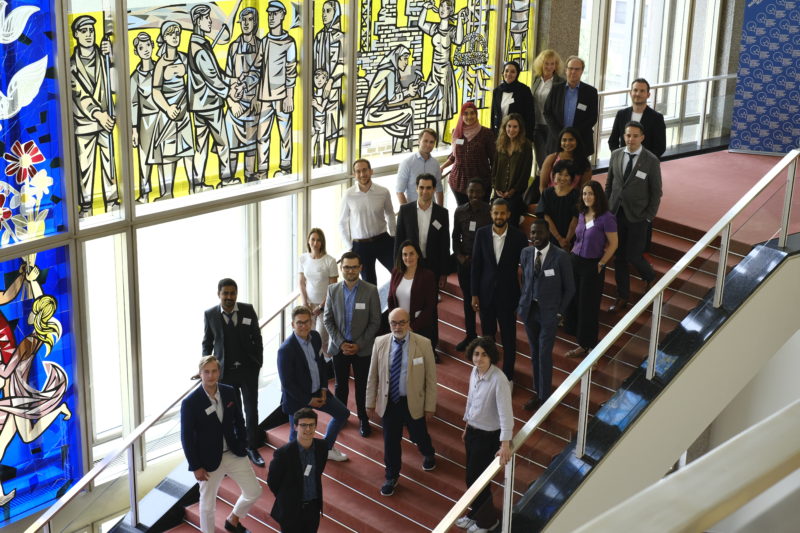On June 17 and 18, 2022 United Europe’s Advocacy Seminar “Africa and Europe, a strategic partnership at last?” took place at the ESMT, Berlin. The two-day seminar was packed with engaging presentations from private and public sector experts, moderated by Professor Andreas Freytag (University of Jena) and Professor Helmut Asche (University of Mainz), two thought-leading experts and regular contributors to German media on the Africa topic. Together with Hildegard Bentele, Member of the European Parliament, Khadi Camara from the Afrika Verein, the German African Business Association, Heike Hoeffler from the GIZ, the German Development Agency, Marius Ochel from the German Association of the Automotive Industry (VDA), Matthias Wachter from the Federation of German Industries (BDI) and Manuel Fröling from Siemens Energy, 25 selected participants were illuminated on the potential of the EU-Africa partnership on the heels of the African Union-European Union Summit which took place in February 2022 in Brussels.
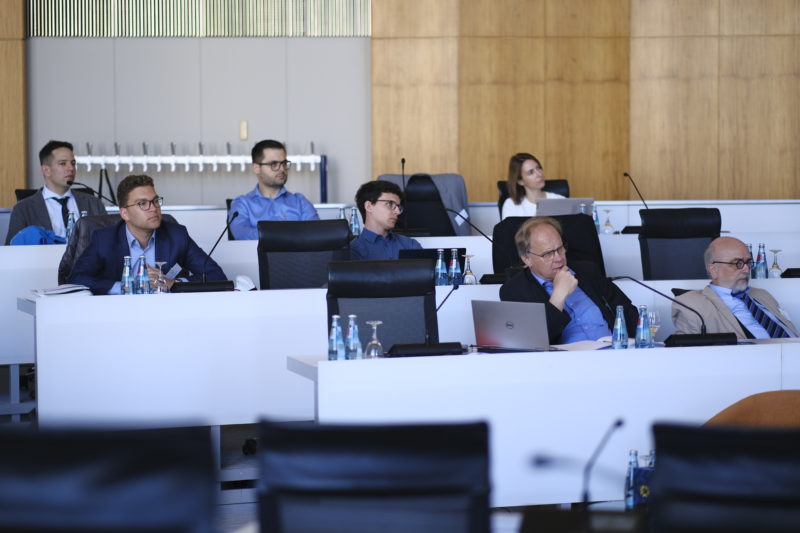
The seminar started with a keynote by Hildegard Bentele, Member of the European Parliament and a Member of the Development, Environment and Energy Committee:
Since the Ukraine war, dependencies have shifted. Europe needs Africa to diversify and transform its energy supplies: “Due to the geopolitical situation, the EU is repositioning towards Africa,” Bentele said. “There is lots of common ground with Africa and although Europe is Africa’s neighbour, China is faster and more anchored on the continent.” The new EU-Africa ‘Partnership of Equals’ promises more private sector engagement and large-scale investments: “We need to focus more on follow-up and tangible results in form of concrete projects on the ground. Rhetoric is not enough,” Bentele underlined. The EU wants more trade with Africa but new green policy instruments i.e. the Emission Trading System (ETS) and the Carbon Border Mechanism are putting pressure on African exporters. Whether the EU will help Africa to develop fossil fuels whilst phasing them out at home remains a sticking point in the partnership negotiations: “Africa should do it in a better and smarter way. If the rest of the world is going on this path of powering their development with fossil fuels, we are not going to have a livable planet in the near future. Let us do it the right way. Let us learn from past mistakes and use the abundance of green energy for Africa’s benefit. Africa has a chance to do it better.” Bentele sees the role of Europe in providing Africa with technology and know-how whilst setting the right frameworks for a green transition.
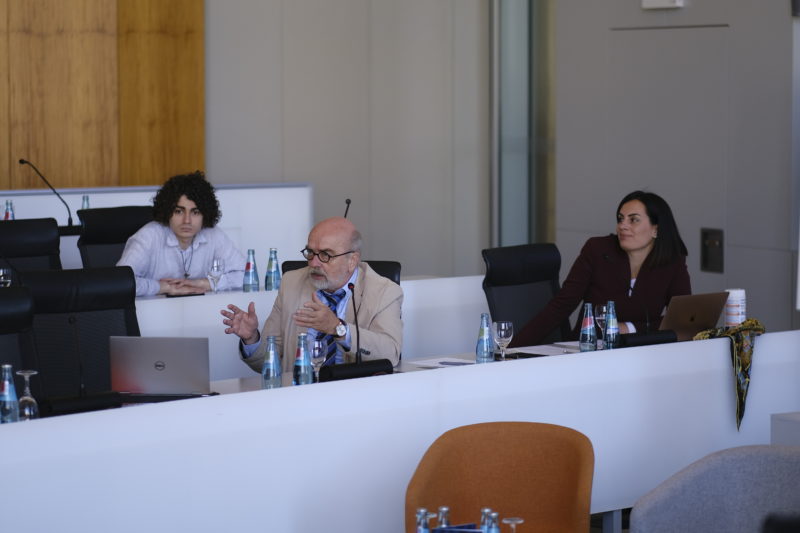
The countries of the so-called “Sahel”, Mali, Burkina Faso, Niger, Central African Republic, South Sudan, Sudan, Eritrea and Chad are forming a contingent crisis area spreading out further to the coastal regions. The Sahel is resource-rich and mostly landlocked. After the fall of Gadaffi, politically organized Islamist groups rapidly spread alongside trans-Sahelian organized crime. The geopolitical risk of a grand Islamist arch, long treated as an external terrorist threat in Europe, has been combatted militarily under French leadership and reinforced by European development aid in a top-down structure, the so-called “Sahel Alliance” based in Brussels. Despite nominally impressive military aid, stabilization missions and EU military training, Europe failed. Violence in the Sahel only accelerated and terrorist threats, as well as civilian collateral, increased.
Today the Sahel is territorially more disintegrated and the civilian governments lost control and are largely deposed and replaced by military rule. “The EU mantra has been supporting the return to democracy, to free and fair elections, wiping out corruption through good governance. The problem is that there is no postbox to whom these noble demands can be addressed. States in the Sahel are not only fragile or weak, they failed. The return to something that never was is simply senseless,” Professor Asche said. Whilst the French repeated the failures of Afghanistan in the Sahel, reconstruction of state and society started in villages bottom-up through talks on local levels. These negotiations on village levels were much more effective than the French coved military operations, without local partners and participation of national armies. Combining talks on the village level with training women to take leadership roles, and simply supporting locally identified projects, implies a paradigm shift in European Development Aid Cooperation and military doctrine, Professor Asche concluded.
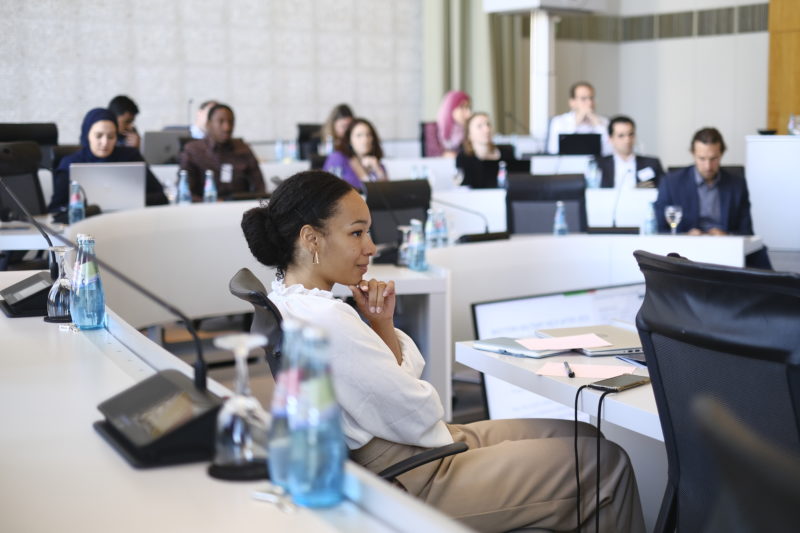
Africa, our neighbour, is considered an energy source whilst still lacking universal energy access: roughly 24% of the African continent is electrified and only 40% of Africans have access to electricity. The stabilization of power grids is one of Africa’s main concerns and although Africa is rich in natural resources and a continent with green energy resources in abundance, it depends on energy supply from abroad. Recent bilateral agreements between the EU and Africa provide Europe with resources in exchange for enhancing Africa’s own energy capacity, particularly in rural areas.
Large oil & gas cooperations operate for centuries on the African continent but for more private sector engagement, Africa and Europe need a better framework and better access to capital. The current energy cooperation is one-sided and not sustainable long-term. Developing fossil fuels has been outlawed since the Paris Agreement, however developing renewables is taking too long and there is simply not enough commitment, capital and know-how on the ground. The European engagement on the continent is neither united nor coordinated: Europe is not engaging as an entity and whilst we see encouraging Member State level engagements, a European approach could be more impactful and effective.
If Europe wants to develop projects and in particular hydrogen on a large scale, a united approach, better frameworks for the private sector and local capacity building are needed: “If we don’t think in that direction, hydrogen will simply be the next oil and nothing will change. Continental unity is a very important aspect in the equation to reach real African-European cooperation. We need to do more in terms of education and we need a more inclusive approach.” For Camara, Africa is not a short-term solution, it is a long-term necessity: “We need to diversify our raw material dependencies and eventually move parts of our energy-intensive industries into Africa where green power is available in abundance. We have to have that intrinsic motivation to strengthen the ties and to come closer to our African neighbour.”
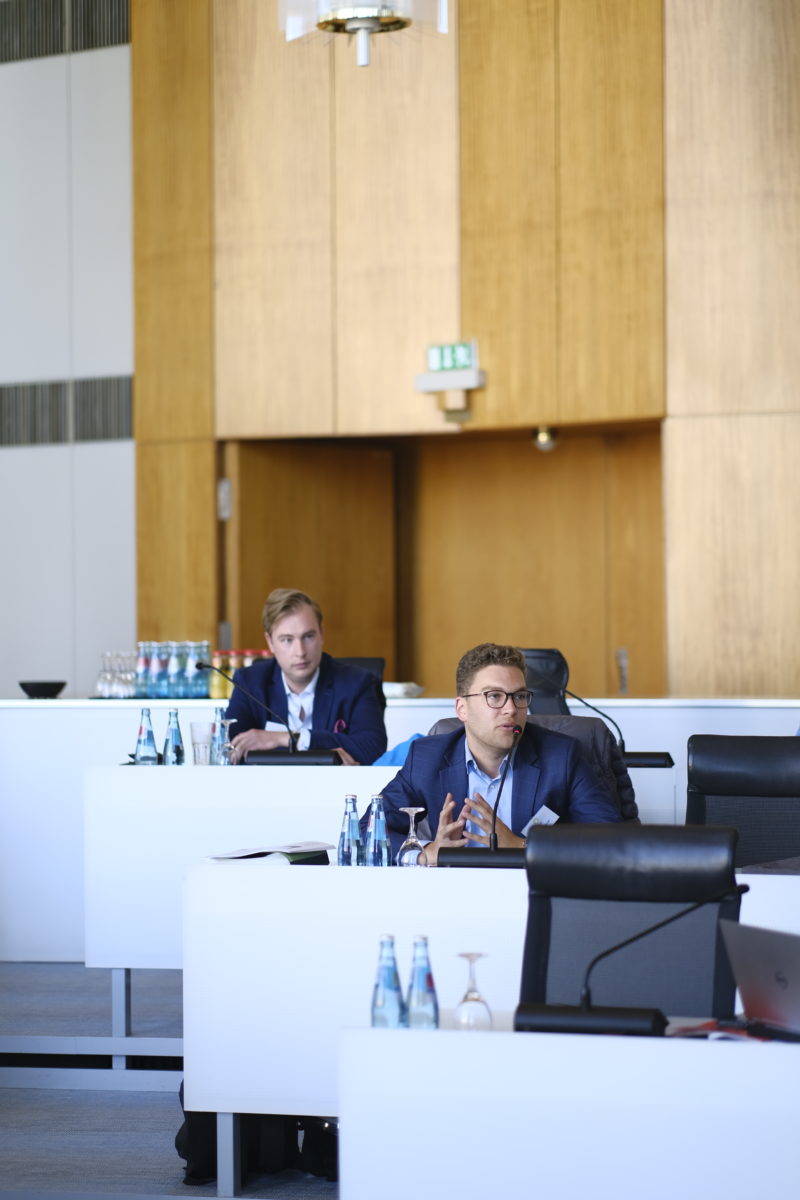
The VDA operates through a partnership initiative with the African Association of Automotive Manufacturers (AAAM), supporting the partner associated with the establishment of framework conditions, infrastructure and private sector activation, knowledge transfer and innovation. The Federal Ministry for Economic Cooperation and Development (BMZ) supports this partnership within the framework of the “Special Initiatives (SI) Training and Employment”. The initiative creates suitable conditions for private investment in an organised African automotive industry for the economic development of the industrial sector, innovation and opening up of new markets in the African continent.
The initiative is a capacity-building partnership working towards the reduction of trade barriers, improvement of investment climate, marketing and image building and the design of PPD mechanisms with the vision to establish a pan-African Auto Pact. The auto pact will develop assembly hubs across Africa, and scale the industry through regional collaboration and shared value chains in order to support the collaboration of regions across Africa. “The support and engagement of the private sector is the main driver for the development of industry across Africa which is crucial for job and value chain creation,” Marius Ochel concluded.
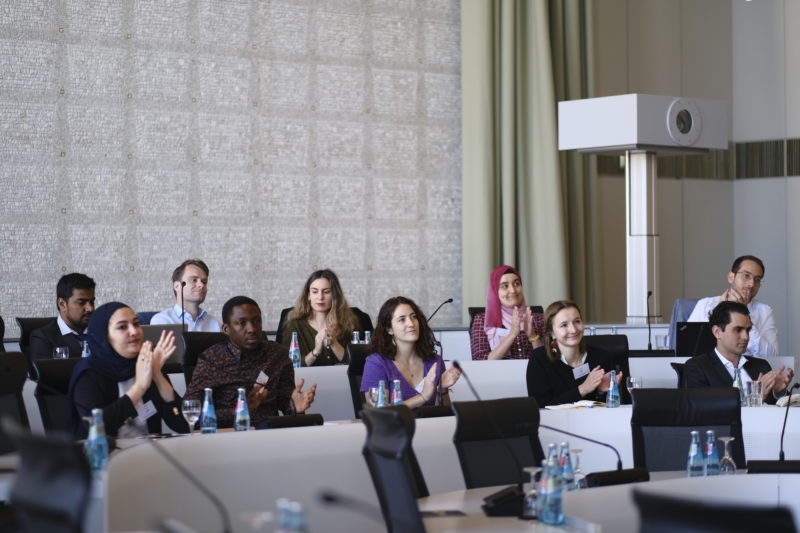
Heike Hoeffler from the GIZ (Gesellschaft für internationale Zusammenarbeit) talked about Africa’s agriculture between food security and modern value chains:
When it comes to development aid it is important to identify spheres of influence and what can be done with existing structures and conditions on the ground to make a change. On climate change and population growth, there is very little to be done from an agro-economic perspective. In Africa, the agriculture growth rate is in sync with economic growth. Increasing Africa’s GDP depends on increasing productivity and agro-yields. Agriculture is the main employer on the continent and provides 65% of livelihoods in Africa, especially for women.
“In order to make Africa’s agriculture more productive within the given resource frame, we have to balance food security vs modern value chains. Tea crops in Kenya, for example, do not prevent food insecurities and are grown for high yield exports dependent on global market price: both are needed – global market access and production for the local market,” Hoeffler said. “The development approach is to invest in value, yields should not take the center stage only, also a sense of nutrition is important to value creation, alongside rules-based development, to make sure workers can earn a living wage from the crops as well as a more ecology-based approach, focusing on CO2 footprint and the environment.” We already see the debate shifting from value chain to food system, taking nutritional status, quality vs. pure production yields more and more into account. “The private sector is the main driver for the transformation and needs to be supported financially,” Hoeffler remarked. Research, development, knowledge and innovation are of fundamental importance for securing food supplies: how to use fertilisers efficiently, how to adapt cultivation to climate change and how to protect food from decay through suitable storage methods.
Hoeffler put this into perspective: “It is a dire situation and the war in Ukraine perpetuated existing problems into a storm – a very grim situation comprised of conflict, droughts, market trade distortions and economic shocks due to Covid19. Also with a worrisome outlook on the supply of fertilizers; the Phosphorus boundary will hit our planet first and is irreversible, reserves will be out within 20 years. We will see a significant price increase for food in the coming years.” The number of undernourished people worldwide has already been rising in 2020 – there are 768m people going hungry. 750,000 people are facing starvation of death in Ethiopia, Yemen, South Sudan, Somalia and Afghanistan. 276 million people are facing acute food insecurity in 81 countries, and this number could increase to 323 million people by the end of this year.
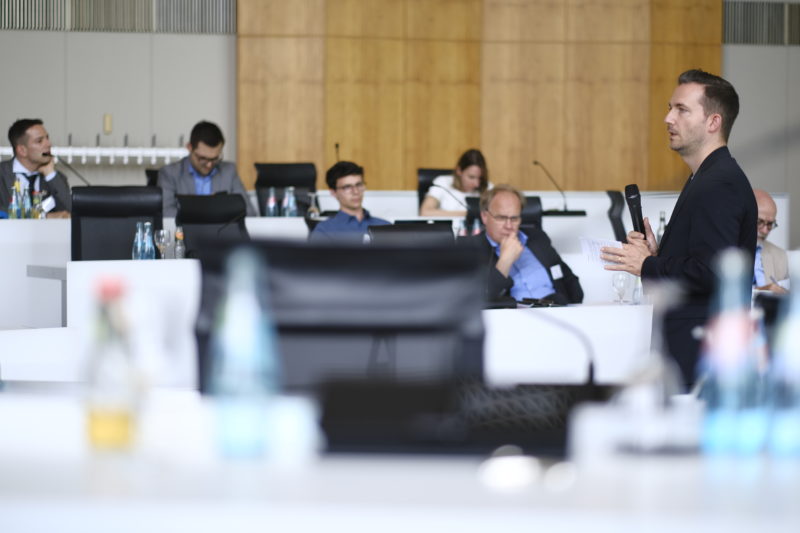
Matthias Wachter from the Federation of German Industries, BDI, gave strategic examples of mining partnerships in Africa: Critical Raw Materials come mainly from Africa and China. The EU is currently hugely dependent on rare earth materials from China. This dependency is already bigger and more critical than the dependency on oil and gas. Since the War in Ukraine diversification of supply chains has taken strategic centre stage: Africa is a resource-rich continent and minerals are also produced there. Kobald from Congo counts for over 70% of the global supply for example and is needed for e-mobility. “The energy transformation is a key driver for raw materials and rare earth materials (IT, Windturbines, etc) and we will only need more of it in the future not less. New technologies will create more dependencies on rare earth. If we don’t diversify our dependency will only increase.” warned Wachter. Europe’s strategic question is how to cope with the increasing raw material demand in the future? Africa plays an important role here as Europe’s resource-rich neighbour. Europe has clearly been underrepresented on the African continent: “Only about 2% of our export goes to Africa and about 2% of our imports come from Africa,” concluded Wachter.
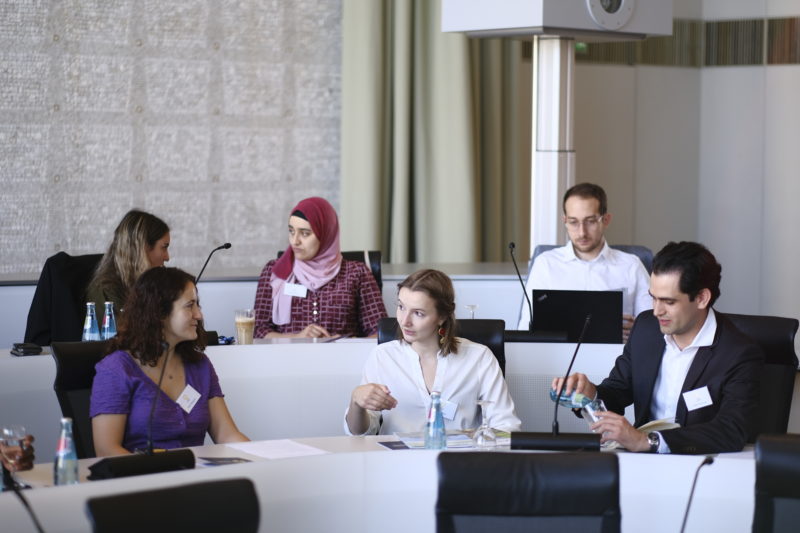
Professor Asche (University of Mainz) on Africa’s Resource Curse: Half a dozen mineral resource-rich countries are located on the African continent alone and its geographic location close to Europe makes Africa a strategic partner to the EU. But the blessing of rich mineral endowments comes with the possibility of a “Resource Curse” (Auty, 1993) or the “Paradox of Plenty” (Karl 1997), which has political-economic, social, ecological and social dimensions, among them a subset of economic problems known as the “Dutch Disease” – a term coined in 1977 by the Economist to describe the decline of manufacturing and agricultural exports in the Netherlands after the discovery of large gas reserves. Professor Asche remarked that not one single African country has put its resources to good use: “It is not that they have achieved nothing but rather what would have been possible in regards to education health and infrastructure has largely been squandered for less useful purposes. There is one exception: Botswana has a relatively good education and health system and some of the resource-poor countries do relatively well.”
Mineral resource-rich countries suffer from the so-called “Enclave Syndrome” with very little spill-over to the local population: profits usually go abroad and the mineral sector actively depresses negative impact on the rest of the economy. The exchange rate appreciation hampers productive sectors including the export and import of essential goods. All capital and talent are drawn into the resource sector and the negative impact on the environment aggravates the problem for the rest of the economy. Also, infrastructure is monopolised and built to serve the resource sector only. Complicated policies are required to counter the challenge. So-called North-South partnerships and cooperation for knowledge and technology transfer could be part of the solution.
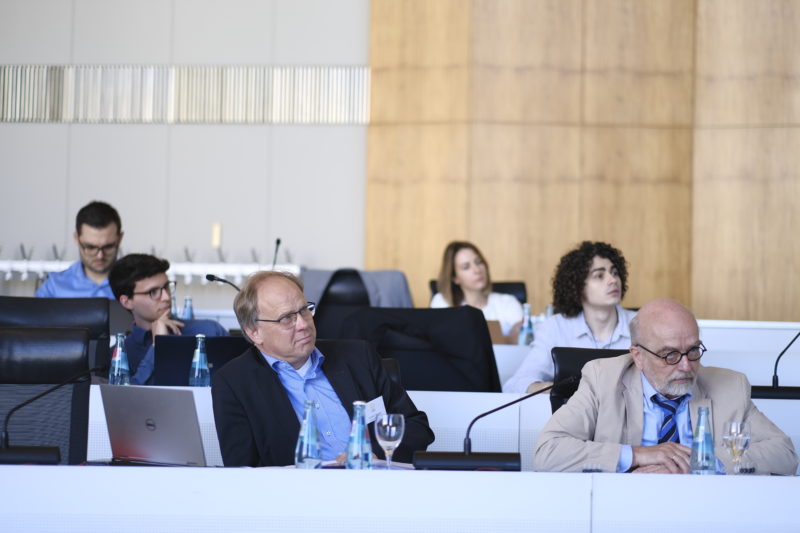
Professor Andreas Freytag (University of Jena, l.) examined Europe’s conventional Development Aid Strategies: Unfortunately, Development Aid can have counter effects on the ground. If things are going to be provided from the outside there is no urgency to develop structures, new policies or local economies. “It actually promotes corruption and creates dependencies”, said Professor Freytag. “Development Aid sometimes hinders development, it creates the so-called Dutch-Disease phenomenon, promotes rent-seeking to the benefit of elites.” According to the LSE scholar Lord Bauer, public development aid is mainly counter-productive, except for centralized projects and emergency aid. The economic assessment of Development Aid concludes that it is most helpful in countries with functioning institutions and good governance. Despite these results, the EU is further expanding Development Aid initiatives: Germany for example has started Compact for Africa and Marshall Plan with Africa. “Eleven German Ministries have Africa Strategies none of which is coordinated. Remittances from the diaspora constitute more support to Africa than Development Aid – much more effective, more targeted and better used-bottom up.”
Freytag observes the so-called White Mans Burden (Kipling 1899): the agenda for aid programs is developed in the minds of the donors without taking the actual needs and priorities of recipient countries as the necessary political starter. Freytag suggests better use of aid money in sync with export or investment promotion measures (on which Manuel Fröling from Siemens Energy dwelled) and the provision of tangible infrastructure: “Europe is good at identifying gaps but really lacks tools and local understanding to help to close it,” Freytag concluded.
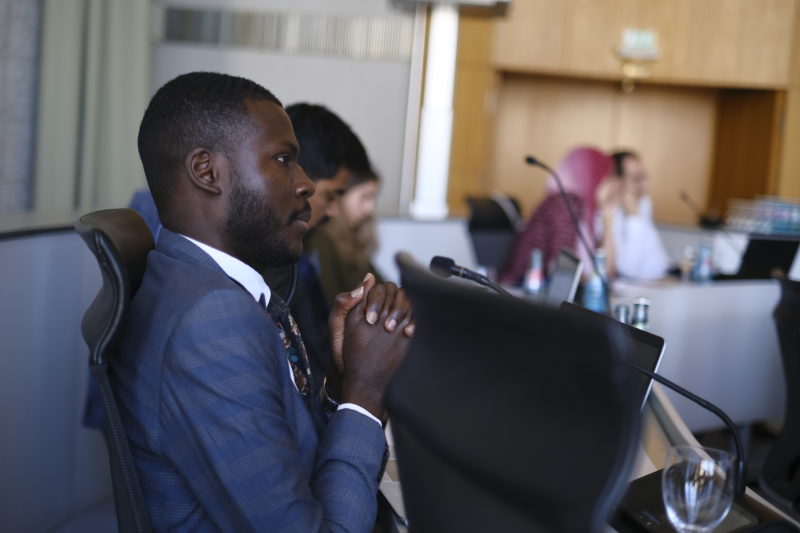
Professor Andreas Freytag (University of Jena) offered insights on China’s Engagement in Africa:
China cannot only be judged in a negative light. China’s engagement in Africa is mainly based on trade, i.e. construction material, mining and production. In recent years import-export relations rose steeply. China invests heavily in Africa’s infrastructure and manufacturing as well. Aid is being provided for huge infrastructure projects and 1.2 million Chinese permanently immigrated to Africa so far. China is firmly anchored in the African continent which underlines its long-term commitment. The Chinese government delegated up to 300 civil servants to each African country – in comparison Germany is sending only 7 delegates to African countries. According to the Economist, Chinese loans peaked in 2016 and are now slightly decreasing. China doesn’t operate under OECD guidelines and lending conditions are rather opaque. “China is not only providing money but also basic infrastructure which creates desperately needed jobs in the African continent however under questionable conditions. Nevertheless, China offers Africa a different option to Europe,” Professor Freytag concluded: “There are lots of strings attached for example freedom of speech and humanitarian standards are being severely threatened. No strings attached is a myth and we can see China’s also meddling on the continent for example through strategic military investments along Africa’s coastline.”
Professor Helmut Asche, University of Mainz talked about Russia’s Engagement in Africa: Russia’s engagement in Africa is severely underresearched in regards to scope, dimension, cause and effect, which is the main difference from China’s engagement in Africa – currently filling libraries. The new Russia Africa policy started back in 2017 and constituted a recent phenomenon made up of four pillars of intervention: Mercenaries, Military, Mining and Propaganda with systematic and strategic campaigning unchartered by any other media, Russia is pushing anti-western narratives and exploits the narrative of colonisation to undermine Europe in the region. Russian engagement focuses on key resource-rich countries such as Libya, Sudan, CAR, Mali, Cameroon and Mozambique. Russia’s engagement is centred on providing private security and military aid in fragile and failed states engaging in proxy and civil wars with organised groups like Wagner, designed to contain risks for Russia’s interests in extractives and its primary objective of geopolitical influence. Russia’s export is based on mineral resources and military power and although arguably a destructive approach, Russia’s policy finds acceptance in both Africa’s elite and parts of the population. Why is Russia’s new African policy so strikingly effective? The likely reasons are Africa’s genuine cause for disenchantment with former colonial powers and compelling economic interests in particular currently grain imports. Not to underestimate is also Russia’s effective propaganda through media. “Europe needs a communication strategy of its own on the African continent to counter Russia’s new Africa policy,” Professor Asche concluded.
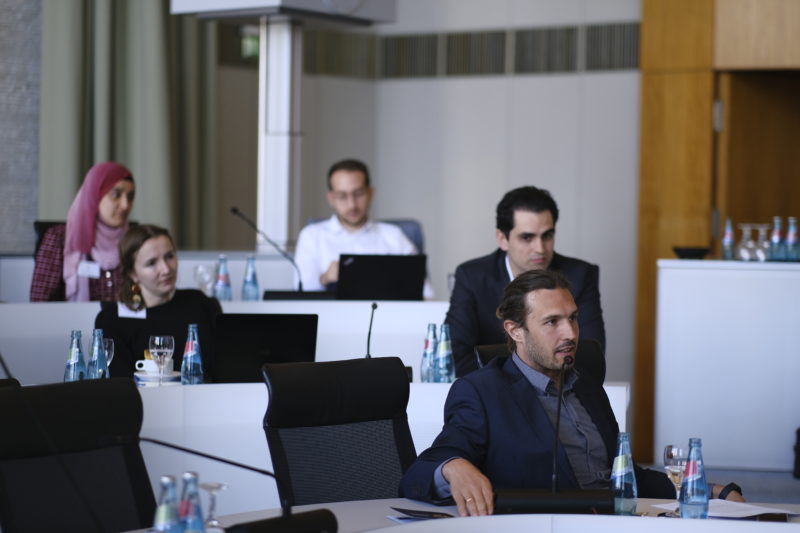
When doing business in Africa, the Africa Business Guide, the German-African Business Association and the German Chambers of Commerce abroad offer support to German companies. Alongside, the Federal Government provides different guarantee instruments to support German companies in Africa to secure access to challenging markets. Manuel Froeling touched upon the fundamentals of the export credit guarantees (also known as Hermes Cover) and the investment guarantees, both being used for large-scale projects in Africa: The Hermes guarantees are managed by Euler Hermes as the Export Credit Agency (ECA). The exporter can insure himself against default on repayment claims due to economic and political reasons. Banks can also use the Hermes Cover for financing these exports. Often, the funding of large transactions in African countries is only possible through the provision of the Hermes Cover. The Interministerial Committee (IMC) defines conditions for the granting of export guarantees for each country in Africa. Although the export credit guarantees are available to all German exporters doing business in Africa, only 1.5% of German exports were covered last year under this scheme. “It would be good to see even better conditions for African countries although a lot has been done by the German Government, especially in the past years,” said Manuel Fröling.
ECA support is highly regulated. The so-called “OECD consensus” has set uniform minimum standards for export credit and the consensus has been transposed into EU law. It covers all state-supported export credits which have a repayment term of two years or more. However, Non-Participants in the arrangement have become important providers of ECA-covered export finance solutions. “China, India and Brazil should be part of the OECD consensus otherwise we won’t see a level playing field for Europe in the near future,” Fröling remarked. There are also other important international regulations such as the OECD Recommendation of the Council on Common Approaches for Officially Supported Export Credits or the Recommendation on Sustainable Lending Practices and Officially Supported Exports Credits. Investment guarantees are another important instrument, offered by the German Government. This set of instruments can be used by a company to hedge eligible German direct investments in African countries against possible political risks. Commercial risks are not covered. Banks can also use the instruments of investment guarantees when financing the investment of a project. For example, a bank can have an investment-like loan secured with the help of investment guarantees. Also, for this instrument there is an IMC-similar composition as for the Hermes guarantees, only here is PwC the agent and responsible for the management. “Getting an investment guarantee for example for Mali for large investments is very challenging because of the limited cover available and this is exactly the dilemma because they need it most. And to stabilize those regions development is urgently needed,” Fröling concluded. There is a willingness to improve and drive investments into Africa and lots of barriers have already been lowered through initiatives such as Compact for Africa. However, there is still room for improvement.
We would like to thank our co-organizers Professors Andreas Freytag and Helmut Asche, presenters, participants from all across Europe and especially our members who have made this event possible.
United Europe is a non-profit association financed exclusively through membership fees and donations. Please consider making a donation so we can continue to drive forward our agenda of making Europe more united.



